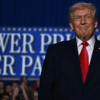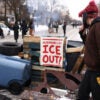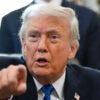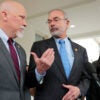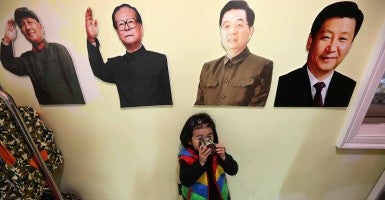Demands by Hong Kong’s people for the autonomy and freedom that China promised has gotten Beijing’s autocrats into such a tizzy that they’re losing sight of their long-term interests. At some point, they will have to understand that keeping promises is not just a matter of civilized behavior, but also a matter of successful statecraft. A nation that breaks its own word loses credibility on the world stage.
China’s latest broken promise came over the weekend as Beijing informed members of the foreign affairs committee of the British House of Commons that they would be barred entry into Hong Kong. Chairman Sir Richard Ottaway told The Guardian on Saturday that the Chinese Embassy had given the members the news.
The refusal to grant the MPs entry to the former British colony breaks the Joint Declaration, an agreement signed in 1984 between China and the United Kingdom and entered into the United Nations as an international treaty. More broadly it violates the clear understanding in Hong Kong’s constitution, the Basic Law, that authorities in Hong Kong retain authority in matters of immigration.
The visit, ironically, had been planned as an inquiry into how well the Joint Declaration was holding up 30 years on and 17 years after the handover of sovereignty from Britain to China. The embassy’s action came as demonstrations by the people of Hong Kong demanding the right to elect local leaders turned violent after police charged the protesters. Protest leaders were surrendering to police this week.
Barring entry to the MPs is of course not the first time China has broken its word. In the Joint Declaration and in statements by Chinese leaders going back 30 years, China has promised universal suffrage, a “high degree of autonomy” and respect for basic freedoms.
It all went under the formula of “One Country, Two Systems” first devised by former leader Deng Xiaoping as a means to attract free and democratic Taiwan into unification with the mainland under Communist Party rule.
China’s inflexibility and its latest move on the MPs has managed what many Hong Kong democracy campaigners bemoaned was impossible only a few weeks ago: It has stirred the former colonial power to side with its former subjects. The House of Commons Tuesday had an emergency debate on the matter.
Barring the MPs “would only harm China’s reputation and financial interest in an increasingly global world,” said Sir Richard during the Commons debate. Even the European Parliament is holding hearings on Hong Kong this week.
China’s actions also have set back any hopes of reconciliation across the Taiwan Straits. Testifying before the House Committee on Foreign Affairs’ Subcommittee on Asia and the Pacific today, Heritage Foundation Senior Research Fellow Dean Cheng said, “Developments in Hong Kong mean that ‘one country, two systems’ is likely permanently off the table as a settlement approach for cross-strait relations. In fact, any kind of political reconciliation between the PRC and Taiwan has been set back for the foreseeable future.”
As for Hong Kong itself, Washington may help salvage One Country, Two Systems there by enforcing current law and extending its safeguards regarding Chinese domination of Hong Kong. Under the Hong Kong Policy Act of 1992, the president may determine that Hong Kong is not sufficiently autonomous to justify separate legal treatment in a given area. The bar to travel by these British MPs is reason enough to consider whether Hong Kong, indeed, is autonomous with regard to immigration.
After all, if the central government can determine this travel is a matter of foreign affairs, and therefore justifiably within its jurisdiction, what is to stop it from determining the same about virtually any travel to Hong Kong? The president and Congress can also enact the Hong Kong Human Rights and Democracy Act. This would flip the certification around by requiring the president to positively certify that Hong Kong is sufficiently autonomous to justify separate treatment before exempting it from future laws, agreements or arrangements applicable to the People’s Republic of China.
